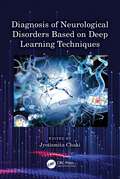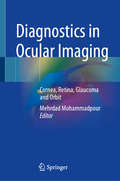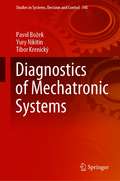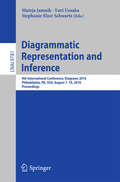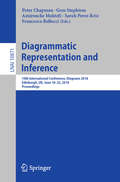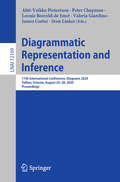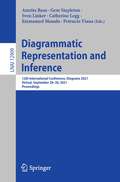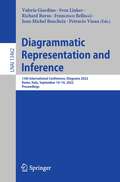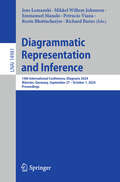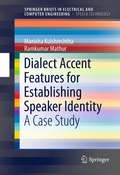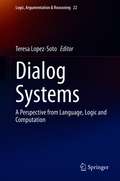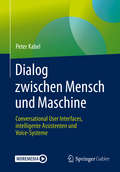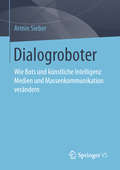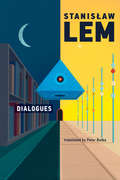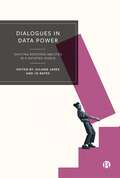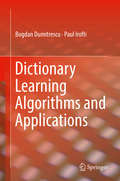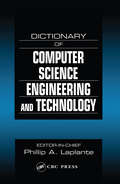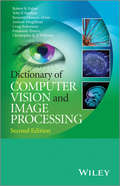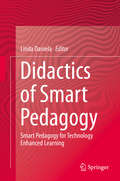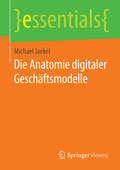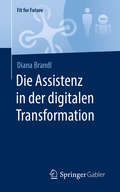- Table View
- List View
Diagnosis of Neurological Disorders Based on Deep Learning Techniques
by Jyotismita ChakiThis book is based on deep learning approaches used for the diagnosis of neurological disorders, including basics of deep learning algorithms using diagrams, data tables, and practical examples, for diagnosis of neurodegenerative and neurodevelopmental disorders. It includes application of feed-forward neural networks, deep generative models, convolutional neural networks, graph convolutional networks, and recurrent neural networks in the field of diagnosis of neurological disorders. Along with this, data preprocessing including scaling, correction, trimming, and normalization is also included. Offers a detailed description of the deep learning approaches used for the diagnosis of neurological disorders. Demonstrates concepts of deep learning algorithms using diagrams, data tables, and examples for the diagnosis of neurodegenerative, neurodevelopmental, and psychiatric disorders. Helps build, train, and deploy different types of deep architectures for diagnosis. Explores data preprocessing techniques involved in diagnosis. Includes real-time case studies and examples. This book is aimed at graduate students and researchers in biomedical imaging and machine learning.
Diagnostics in Ocular Imaging: Cornea, Retina, Glaucoma and Orbit
by Mehrdad MohammadpourThis book presents a new avenue in the field of ophthalmology and sheds light on the field of eye imaging. With the increasing availability of electronic devices and their important role in both personal and professional aspects of human life, there is a growing need for perfect vision. Ophthalmic imaging is a major tool for screening and documenting eye diseases in both medical and surgical fields of ophthalmology and is also of use for ophthalmologists around the globe. The number of eye-imaging devices has increased dramatically, however undiagnosed or poorly managed eye diseases remain a significant cause of ocular and visual problems worldwide. This essential guide addresses the need for a book that is dedicated to ophthalmic imaging, covering the cornea, glaucoma, retina and orbital imaging with updates on medical and surgical aspects of the topic.
Diagnostics of Mechatronic Systems (Studies in Systems, Decision and Control #345)
by Tibor Krenický Pavol Božek Yury NikitinThis book provides novel approach to the diagnosis of complex technical systems that are widely used in various kinds of transportation, energy, metallurgy, metalworking, fuels, mining, chemical, paper industries, etc.Effective diagnostic systems are necessary for the early detection of errors in mechatronic systems, for the organization of maintenance and for the assessment of the performed service quality. Unfortunately, the practical use of AI in the diagnosis of mechatronic systems is still quite limited and the inability to build effective mechatronic systems leads to significant economic losses and dangers. The main aim of this book is to contribute to knowledge within the topic of diagnostics of mechatronic systems by the analysis of the elements reliability characteristics, using methods, models and algorithms for diagnostics and by studying examples of model diagnostic systems using AI methods based on neural networks, fuzzy inference systems and genetic algorithms.
Diagrammatic Representation and Inference
by Mateja Jamnik Yuri Uesaka Stephanie Elzer SchwartzThe 6th International Conference on the Theory and Application of Diagrams - Diagrams 2010 - was held in Portland, USA in August 2010. Diagrams is an international and interdisciplinary conference series, which continues to present the very best work in all aspects of research on the theory and application of diagrams. Some key questions that researchers are tackling concern gaining an insight into how diagrams are used, how they are rep- sented, which types are available and when it is appropriate to use them. The use of diagrammatic notations is studied for a variety of purposes including communication, cognition, creative thought, computation and problem-solving. Clearly, this must be pursued as an interdisciplinary endeavor, and Diagrams is the only conference series that provides such a united forum for all areas that are concerned with the study of diagrams: for example, architecture, arti?cial intelligence,cartography,cognitivescience,computer science,education,graphic design, history of science, human-computer interaction, linguistics, logic, ma- ematics, philosophy, psychology, and software modelling. The articles in this volume re?ect this variety and interdisciplinarity of the ?eld.
Diagrammatic Representation and Inference: 10th International Conference, Diagrams 2018, Edinburgh, UK, June 18-22, 2018, Proceedings (Lecture Notes in Computer Science #10871)
by Peter Chapman Amirouche Moktefi Gem Stapleton Sarah Perez-Kriz Francesco BellucciThis book constitutes the refereed proceedings of the 10th International Conference on the Theory and Application of Diagrams, Diagrams 2018, held in Edinburgh, UK, in June 2018.The 26 revised full papers and 28 short papers presented together with 32 posters were carefully reviewed and selected from 124 submissions. The papers are organized in the following topical sections: generating and drawing Euler diagrams; diagrams in mathematics; diagram design, principles and classification; reasoning with diagrams; Euler and Venn diagrams; empirical studies and cognition; Peirce and existential graphs; and logic and diagrams.
Diagrammatic Representation and Inference: 11th International Conference, Diagrams 2020, Tallinn, Estonia, August 24–28, 2020, Proceedings (Lecture Notes in Computer Science #12169)
by Peter Chapman Ahti-Veikko Pietarinen Leonie Bosveld-de Smet Valeria Giardino James Corter Sven LinkerThis book constitutes the refereed proceedings of the 11th International Conference on the Theory and Application of Diagrams, Diagrams 2020, held in Tallinn, Estonia, in August 2020.*The 20 full papers and 16 short papers presented together with 18 posters were carefully reviewed and selected from 82 submissions. The papers are organized in the following topical sections: diagrams in mathematics; diagram design, principles, and classification; reasoning with diagrams; Euler and Venn diagrams; empirical studies and cognition; logic and diagrams; and posters. *The conference was held virtually due to the COVID-19 pandemic. The chapters ‘Modality and Uncertainty in Data Visualization: A Corpus Approach to the Use of Connecting Lines,’ ‘On Effects of Changing Multi-Attribute Table Design on Decision Making: An Eye Tracking Study,’ ‘Truth Graph: A Novel Method for Minimizing Boolean Algebra Expressions by Using Graphs,’ ‘The DNA Framework of Visualization’ and ‘Visualizing Curricula’ are available open access under a Creative Commons Attribution 4.0 International License via link.springer.com.
Diagrammatic Representation and Inference: 12th International Conference, Diagrams 2021, Virtual, September 28–30, 2021, Proceedings (Lecture Notes in Computer Science #12909)
by Amrita Basu Gem Stapleton Emmanuel Manalo Sven Linker Catherine Legg Petrucio VianaThis book constitutes the refereed proceedings of the 12th International Conference on the Theory and Application of Diagrams, Diagrams 2021, held virtually in September 2021. The 16 full papers and 25 short papers presented together with 16 posters were carefully reviewed and selected from 94 submissions. The papers are organized in the following topical sections: design of concrete diagrams; theory of diagrams; diagrams and mathematics; diagrams and logic; new representation systems; analysis of diagrams; diagrams and computation; cognitive analysis; diagrams as structural tools; formal diagrams; and understanding thought processes. 10 chapters are available open access under a Creative Commons Attribution 4.0 International License via link.springer.com.
Diagrammatic Representation and Inference: 13th International Conference, Diagrams 2022, Rome, Italy, September 14–16, 2022, Proceedings (Lecture Notes in Computer Science #13462)
by Richard Burns Francesco Bellucci Valeria Giardino Sven Linker Petrucio Viana Jean-Michel BoucheixThis book constitutes the refereed proceedings of the 13th International Conference on the Theory and Application of Diagrams, Diagrams 2022, held in Rome, Italy, in September 2022. The 11 full papers and 19 short papers presented together with 5 posters were carefully reviewed and selected from 58 submissions. 8 chapters are available open access under a Creative Commons Attribution 4.0 International License via link.springer.com.
Diagrammatic Representation and Inference: 14th International Conference, Diagrams 2024, Münster, Germany, September 27 – October 1, 2024, Proceedings (Lecture Notes in Computer Science #14981)
by Richard Burns Emmanuel Manalo Jens Lemanski Petrucio Viana Mikkel Willum Johansen Reetu BhattacharjeeThis book constitutes the refereed proceedings of the 14th International Conference on the Theory and Application of Diagrams, Diagrams 2024, held in Münster, Germany, during September 27–October 1, 2024. The 17 full papers, 19 short papers and 11 papers of other types included in this book were carefully reviewed and selected from 69 submissions. They were organized in topical sections as follows: Keynote Talks; Analysis of Diagrams; Euler and Venn Diagrams; Diagrams in Logic; Diagrams and Applications; Diagram Tools; Historical Aspects of Diagrams; and Posters.
Dialect Accent Features for Establishing Speaker Identity
by Manisha Kulshreshtha Ramkumar MathurDialect Accent Features for Establishing Speaker Identity: A Case Study discusses the subject of forensic voice identification and speaker profiling. Specifically focusing on speaker profiling and using dialects of the Hindi language, widely used in India, the authors have contributed to the body of research on speaker identification by using accent feature as the discriminating factor. This case study contributes to the understanding of the speaker identification process in a situation where unknown speech samples are in different language/dialect than the recording of a suspect. The authors' data establishes that vowel quality, quantity, intonation and tone of a speaker as compared to Khariboli (standard Hindi) could be the potential features for identification of dialect accent.
Dialog Systems: A Perspective from Language, Logic and Computation (Logic, Argumentation & Reasoning #22)
by Teresa Lopez-SotoThis book focuses on dialog from a varied combination of fields: Linguistics, Philosophy of Language and Computation. It builds on the hypothesis that meaning in human communication arises at the discourse level rather than at the word level. The book offers a complex analytical framework and integration of the central areas of research around human communication. The content revolves around meaning but it also gives evidence of the connection among different points of view. Besides discussing issues of general interest to the field, the book triggers theoretical argumentation that is currently under scientific discussion. It examines such topics as immanent reasoning joined with Recanati's lekta and free enrichment, challenges of internet conversation, inner dialogs, cognition and language, and the relation between assertion and denial. It proposes a dialogical framework for intra-negotiation and gives a geolinguistic perspective on spoken discourse. Finally, it examines dialog and abduction and sheds light on a generation of dialog contexts by means of multimodal logic applied to speech acts.
Dialog zwischen Mensch und Maschine: Conversational User Interfaces, intelligente Assistenten und Voice-Systeme
by Peter KabelDieses Buch beschreibt, wie sich die Interaktion zwischen Menschen und Maschinen in den nächsten Jahren dramatisch verändern wird und wie Unternehmen sowie Institutionen den größtmöglichen Nutzen aus dieser Entwicklung ziehen können.Conversational User Interfaces (CUI) sind die nächste Evolutionsstufe der Schnittstelle zwischen Menschen und den Inhalten oder Diensten des Internets. Wenn Nutzer in natürlicher Sprache mit ihnen reden, können intelligente Assistants, Voice-Systeme und Bots wertvolle Antworten geben und Handlungen auslösen: Sie buchen eine Fahrkarte, verlängern einen Vertrag oder starten eine Überweisung. So entsteht ein neues Ökosystem, das viele Prozesse in Unternehmen und im Alltag revolutionieren wird. Alle Marktteilnehmer müssen sich neu positionieren und verorten.Dieses Buch hilft dabei, die Funktionsweisen und Konsequenzen beim Einsatz von CUIs grundlegend zu verstehen und beantwortet unter anderem folgende Fragen: Woraus setzen sich CUIs und intelligente Assistenten zusammen? Wie funktioniert Natural Language Generation? Welche technischen Herausforderungen entstehen für Unternehmen? Welche Rolle spielt Werbung in dem neuen Ökosystem? Wie funktioniertder berührungslose Konsum? Eine inspirierende Lektüre, die Sie dabei unterstützt, sich in den nächsten Jahren unter den Leadern zu positionieren. Extra: eine Anleitung zum Gestalten Ihres eigenen Test-Bots – dem Friesenbot. Kostenlos für Leser: Testen Sie Ihr Wissen mit Fragen und Antworten zum Buch in der Springer-Nature-Flashcards-App.
Dialogroboter: Wie Bots und künstliche Intelligenz Medien und Massenkommunikation verändern
by Armin SieberTechnologien wie künstliche Intelligenz und Natural Language Programming werden zu Auslösern der sogenannten „Dialogwende“. Darunter versteht dieses Buch die massenweise Verbreitung von autonom sprechenden Sprachdialogsystemen und automatischen Sprachassistenten. Der Autor geht der Frage nach, welche Technologien bereits zur Verfügung stehen oder bald zur Serienreife kommen. Er analysiert konkrete Verwendungen und Einsatzfelder von Bots und stellt sich die Frage, was bei der Planung und Konzeption bedacht werden muss, welche Veränderungen in Medien und Unternehmenskommunikation zu erwarten sind. Das Buch beleuchtet darüber hinaus auch die psychosozialen Folgen, die auf unsere Gesellschaft zukommen, wenn Sprachdialogsysteme in großer Zahl zum Einsatz kommen.
Dialogues
by Stanislaw LemThe first English translation of a nonfiction work by Stanisław Lem, which was "conceived under the spell of cybernetics" in 1957 and updated in 1971.In 1957, Stanisław Lem published Dialogues, a book "conceived under the spell of cybernetics," as he wrote in the preface to the second edition. Mimicking the form of Berkeley's Three Dialogues between Hylas and Philonous, Lem's original dialogue was an attempt to unravel the then-novel field of cybernetics. It was a testimony, Lem wrote later, to "the almost limitless cognitive optimism" he felt upon his discovery of cybernetics. This is the first English translation of Lem's Dialogues, including the text of the first edition and the later essays added to the second edition in 1971. For the second edition, Lem chose not to revise the original. Recognizing the naivete of his hopes for cybernetics, he constructed a supplement to the first dialogue, which consists of two critical essays, the first a summary of the evolution of cybernetics, the second a contribution to the cybernetic theory of the "sociopathology of governing," amending the first edition's discussion of the pathology of social regulation; and two previously published articles on related topics. From the vantage point of 1971, Lem observes that original book, begun as a search for methods "that would increase our understanding of both the human and nonhuman worlds," was in the end "an expression of the cognitive curiosity and anxiety of modern thought."
Dialogues in Data Power: Shifting Response-abilities in a Datafied World
by Juliane Jarke and Jo BatesAvailable open access digitally under CC-BY-NC-ND licence. This book presents emerging themes and future directions in the interdisciplinary field of critical data studies, loosely themed around the notion of shifting response-abilities in a datafied world. In each chapter an interdisciplinary group of scholars discuss a specific theme, ranging from questions around data power and the configuring of data subjects to the intersection of technology and the environment. The book is an invaluable dialogue between disciplines that introduces readers to cutting edge arguments within the field. It will be a key resource for scholars and students who require a guide to this rapidly evolving area of research.
Dicas Profissionais Para Linha De Comando Bash
by Jason Cannon Rafaella C. S. BarrosSe você já disse para si mesmo: "Tem que ter uma maneira melhor de fazer isso", então continue lendo.Como alguém que tem usado a Bash shell quase diariamente por 15 anos, acumulei vários "truques" de linha de comando que me economizaram tempo e frustrações. Dicas Profissionais para Linha de Comando Bash é uma coleção de 10 técnicas que você pode começar a usar imediatamente para aumentar sua eficiência com linha de comando.Eis o que você vai aprender lendo Dicas Profissionais para Linha de Comando Bash:Dica 1: Completar com TabDica 2: Alterar para o diretório anteriorDica 3: Reutilizar o último item da linha de comando anteriorDica 4: Executar novamente um comando que inicia com uma string fornecidaDica 5: Substituição de comandoDica 6: Usar um laço de repetição em "for" na linha de comandoDica 7: Re-executar o comando anterior com privilégios de administradorDica 8: Re-executar o comando anterior enquanto substitui uma stringDica 9: Reutilizar uma palavra na mesma linha de comandoDica 10: Corrigindo erros de digitação e encurtando comandos longos com apelidos
Dictionary Learning Algorithms and Applications
by Bogdan Dumitrescu Paul IroftiThis book covers all the relevant dictionary learning algorithms, presenting them in full detail and showing their distinct characteristics while also revealing the similarities. It gives implementation tricks that are often ignored but that are crucial for a successful program. Besides MOD, K-SVD, and other standard algorithms, it provides the significant dictionary learning problem variations, such as regularization, incoherence enforcing, finding an economical size, or learning adapted to specific problems like classification. Several types of dictionary structures are treated, including shift invariant; orthogonal blocks or factored dictionaries; and separable dictionaries for multidimensional signals. Nonlinear extensions such as kernel dictionary learning can also be found in the book. The discussion of all these dictionary types and algorithms is enriched with a thorough numerical comparison on several classic problems, thus showing the strengths and weaknesses of each algorithm. A few selected applications, related to classification, denoising and compression, complete the view on the capabilities of the presented dictionary learning algorithms. The book is accompanied by code for all algorithms and for reproducing most tables and figures.Presents all relevant dictionary learning algorithms - for the standard problem and its main variations - in detail and ready for implementation;Covers all dictionary structures that are meaningful in applications;Examines the numerical properties of the algorithms and shows how to choose the appropriate dictionary learning algorithm.
Dictionary of Computer Science, Engineering and Technology
by Phillip A. LaplanteA complete lexicon of technical information, the Dictionary of Computer Science, Engineering, and Technology provides workable definitions, practical information, and enhances general computer science and engineering literacy. It spans various disciplines and industry sectors such as: telecommunications, information theory, and software and hardware systems. If you work with, or write about computers, this dictionary is the single most important resource you can put on your shelf.The dictionary addresses all aspects of computing and computer technology from multiple perspectives, including the academic, applied, and professional vantage points. Including more than 8,000 terms, it covers all major topics from artificial intelligence to programming languages, from software engineering to operating systems, and from database management to privacy issues. The definitions provided are detailed rather than concise. Written by an international team of over 80 contributors, this is the most comprehensive and easy-to-read reference of its kind. If you need to know the definition of anything related to computers you will find it in the Dictionary of Computer Science, Engineering, and Technology.
Dictionary of Computer Vision and Image Processing
by Craig Robertson Kenneth Dawson-Howe Toby P. Breckon Christopher K. Williams Andrew Fitzgibbon Robert B. Fisher Emanuele TruccoWritten by leading researchers, the 2nd Edition of the Dictionary of Computer Vision & Image Processing is a comprehensive and reliable resource which now provides explanations of over 3500 of the most commonly used terms across image processing, computer vision and related fields including machine vision. It offers clear and concise definitions with short examples or mathematical precision where necessary for clarity that ultimately makes it a very usable reference for new entrants to these fields at senior undergraduate and graduate level, through to early career researchers to help build up knowledge of key concepts. As the book is a useful source for recent terminology and concepts, experienced professionals will also find it a valuable resource for keeping up to date with the latest advances.New features of the 2nd Edition:Contains more than 1000 new terms, notably an increased focus on image processing and machine vision terms;Includes the addition of reference links across the majority of terms pointing readers to further information about the concept under discussion so that they can continue to expand their understanding;Now available as an eBook with enhanced content: approximately 50 videos to further illustrate specific terms; active cross-linking between terms so that readers can easily navigate from one related term to another and build up a full picture of the topic in question; and hyperlinked references to fully embed the text in the current literature.
Did I Say That Out Loud?: Notes on the Chuff of Life
by Fi Glover Jane Garvey'Joyous, wise, reassuring and laugh-out-loud funny. I love these two women so much.' Elizabeth Day'A book like no other. Honest and very, very funny. Some bits made me want to cheer - a sentence on parenting teenage girls was so good I may get it tattooed on myself, possibly in Hebrew.' Sara Cox'If books were bubble baths... this was a truly luxurious read - filled with warmth, wit and wisdom. I enjoyed it so much that I actually felt guilty afterwards - books shouldn't be this enjoyable, should they?' Anita Anand'You'll laugh, you'll nod your head so vigorously in agreement that you'll end up with whiplash and you'll buy a copy of this book for all your friends for Christmas.If you loved the late, great Victoria Wood, then you'll love Fi and Jane too.' Red magazineAward-winning broadcasters Fi Glover and Jane Garvey don't claim to have all the answers (what was the question?), but in these hilarious and perceptive essays they take modern life by its elasticated waist and give it a brisk going over with a stiff brush.They riff together on the chuff of life, from pet deaths to broadcasting hierarchies, via the importance of hair dye, the perils and pleasures of judging other women, and the perplexing overconfidence of chino-wearing middle-aged white men named Roger. Did I Say That Out Loud? covers essential life skills (never buy an acrylic jumper, always decline the offer of a limoncello), ponders the prudence of orgasm merchandise and suggests the disconcerting possibility that Christmas is a hereditary disease, passed down the maternal line. At a time of constant uncertainty, what we all need is the wisdom of two women who haven't got a clue what's going on either.
Did I Say That Out Loud?: Notes on the Chuff of Life
by Fi Glover Jane Garvey'Joyous, wise, reassuring and laugh-out-loud funny. I love these two women so much.' Elizabeth Day'I can say with full confidence that Jane Garvey and Fi Glover are the two funniest women on planet earth right now.' Dolly Alderton'A book like no other. Honest and very, very funny. Some bits made me want to cheer - a sentence on parenting teenage girls was so good I may get it tattooed on myself, possibly in Hebrew.' Sara Cox'You'll laugh, you'll nod your head so vigorously in agreement that you'll end up with whiplash and you'll buy a copy of this book for all your friends for Christmas. If you loved the late, great Victoria Wood, then you'll love Fi and Jane too.' Red magazineAward-winning broadcasters Fi Glover and Jane Garvey don't claim to have all the answers (what was the question?), but in these hilarious and perceptive essays they take modern life by its elasticated waist and give it a brisk going over with a stiff brush.They riff together on the chuff of life, from pet deaths to broadcasting hierarchies, via the importance of hair dye, the perils and pleasures of judging other women, and the perplexing overconfidence of chino-wearing middle-aged white men named Roger. Did I Say That Out Loud? covers essential life skills (never buy an acrylic jumper, always decline the offer of a limoncello), ponders the prudence of orgasm merchandise and suggests the disconcerting possibility that Christmas is a hereditary disease, passed down the maternal line. At a time of constant uncertainty, what we all need is the wisdom of two women who haven't got a clue what's going on either.
Did I Say That Out Loud?: Notes on the Chuff of Life
by Fi Glover Jane GarveyFeatures audiobook-exclusive extra content, including a mid-record tea break and bespoke introductions for each chapter.'Joyous, wise, reassuring and laugh-out-loud funny. I love these two women so much.' Elizabeth Day'A book like no other. Honest and very, very funny. Some bits made me want to cheer - a sentence on parenting teenage girls was so good I may get it tattooed on myself, possibly in Hebrew.' Sara CoxAward-winning broadcasters Fi Glover and Jane Garvey don't claim to have all the answers (what was the question?), but in these hilarious and perceptive essays they take modern life by its elasticated waist and give it a brisk going over with a stiff brush.They riff together on the chuff of life, from pet deaths to broadcasting hierarchies, via the importance of hair dye, the perils and pleasures of judging other women, and the perplexing overconfidence of chino-wearing middle-aged white men named Roger.Did I Say That Out Loud? covers essential life skills (never buy an acrylic jumper, always decline the offer of a limoncello), ponders the prudence of orgasm merchandise and suggests the disconcerting possibility that Christmas is a hereditary disease, passed down the maternal line.At a time of constant uncertainty, what we all need is the wisdom of two women who haven't got a clue what's going on either.
Didactics of Smart Pedagogy: Smart Pedagogy for Technology Enhanced Learning
by Linda DanielaThe focus on smart education has become a new trend in the global educational field. Some countries have already developed smart education systems and there is increasing pressure coming from business and tech communities to continue this development. Simultaneously, there are only fragmented studies on the didactic aspects of technology usage. Thus, pedagogy as a science must engage in a new research direction—smart pedagogy. This book seeks to engage in a new research direction, that of smart pedagogy. It launches discussions on how to use all sorts of smart education solutions in the context of existing learning theories and on how to apply innovative solutions in order to reduce the marginalization of groups in educational contexts. It also explores transformations of pedagogical science, the role of the educator, applicable teaching methods, learning outcomes, and research and assessment of acquired knowledge in an effort to make the smart education process meaningful to a wide audience of international educators, researchers, and administrators working within and tangential to TEL.
Die Anatomie digitaler Geschäftsmodelle (essentials)
by Michael JaekelDieses essential bietet eine Einführung in das Thema digitale Geschäftsmodelle. Es zielt insbesondere darauf ab, ihr Wesen verständlich zu machen, und zeigt ihre Ausgestaltung anhand von Beispielen. Die zunehmende Digitalisierung nahezu aller Lebensbereiche hat gravierende Auswirkungen auf bestehende Geschäftsmodelle in zahlreichen Branchen. Daher ist ein besseres Verständnis digitaler Geschäftsmodelle dringend erforderlich. Michael Jaekel erläutert das innere Gefüge, die Anatomie digitaler Geschäftsmodelle. Hinzu kommen Anregungen und Prinzipien für ihr Design. Die Ausführungen erfolgen nicht abstrakt, sondern praxisorientiert am Modell einer digitalen Smart-City-Apps-Plattform mit Ökosystem.
Die Assistenz in der digitalen Transformation (Fit for Future)
by Diana BrandlDie Arbeitswelt 4.0 ist vor allem durch die zunehmende Digitalisierung geprägt. Viele Prozesse werden immer stärker digital unterstützt, bis hin zur vollständigen Automatisierung. Das hat Auswirkungen auf das Berufsbild und die Aufgaben der Assistenz und bringt sowohl Herausforderungen als auch Chancen mit sich.Dieses Buch stellt die sich wandelnde Rolle der Assistenz im Office 4.0 und deren gestalterische Möglichkeiten vor. Dazu portraitiert es die Meinungen verschiedener Assistenzen und Entscheider in renommierten Unternehmen, die wertvolle Einblicke in ihren Arbeitsalltag geben. In diesem Zusammenhang werden auch die Technologie der digitalen Assistenten und deren Nutzungsmöglichkeiten im Büroalltag ausführlich beleuchtet und viele praktische Tools vorgestellt, die Arbeit abnehmen und Raum für neue Aufgaben schaffen können. Zahlreiche Beispiele aus der Praxis geben inspirierende Anregungen und zeigen, dass Management-Assistenzen ein wichtiger Treiber der digitalen Transformation sind.Über die Buchreihe "Fit for Future"Die Zukunft wird massive Veränderungen im Arbeits- und Privatleben mit sich bringen. Tendenzen gehen sogar dahin, dass die klassische Teilung zwischen Arbeitszeit und Freizeit nicht mehr gelingen wird. Eine neue Zeit – die sogenannte „Lebenszeit“ – beginnt. Laut Bundesregierung werden in den nächsten Jahren viele Berufe einen tiefgreifenden Wandel erleben und in ihrer derzeitigen Form nicht mehr existieren. Im Gegenzug wird es neue Berufe geben, von denen wir heute noch nicht wissen, wie diese aussehen oder welche Tätigkeiten diese beinhalten werden. Betriebsökonomen schildern mögliche Szenarien, dass eine stetig steigende Anzahl an Arbeitsplätzen durch Digitalisierung und Robotisierung gefährdet sind. Die Reihe „Fit for future“ beschäftigt sich eingehend mit dieser Thematik und bringt zum Ausdruck, wie wichtig es ist, sich diesen neuen Rahmenbedingungen am Markt anzupassen, flexibel zu sein, seine Kompetenzen zu stärken und „Fit for future“ zu werden. Der Initiator der Buchreihe Peter Buchenau lädt hierzu namhafte Experten ein, ihren Erfahrungsschatz auf Papier zu bringen und zu schildern, welche Kompetenzen es brauchen wird, um auch künftig erfolgreich am Markt zu agieren. Ein Buch von der Praxis für die Praxis, von Profis für Profis. Leser und Leserinnen erhalten „einen Blick in die Zukunft“ und die Möglichkeit, ihre berufliche Entwicklung rechtzeitig mitzugestalten.
